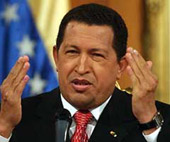USA and Venezuela spar over deliveries of Russian arms
The US administration views the Venezuelan president as a rather dangerous rival
Hugo Chavez, the President of Venezuela, has been irritating the US administration for quite a long period of time already. In 2002, the American government backed the plotters, who temporarily dismissed Chavez from his position in 2002. The Venezuelan president is not sitting on his hands either: he tries to use any possible occasion to criticize the US-led politics. Therefore, the relations between the two countries are not likely to improve in the near future. 
George W. Bush has ordered his assistants to develop a strategy to restrain Chavez on the allegation of his “subversive activities” in Latin America. Roger Pardo-Maurer, deputy assistant secretary for western hemisphere affairs, said in an interview with the Financial Times that Chavez had become a problem because he had been using his oil money and influence to introduce his confronting style in other countries' policies. It seems a little strange that such comments were released from the undersecretary of defense, but not from a spokesman for the US Department of State.
The message about the development of a new strategy against Chavez appeared soon after Venezuela signed a contract to purchase 40 Russian military choppers from Russia. The US administration estimated the deal rather negatively. As soon as Moscow and Caracas announced their intention to sign the contract a month ago, Washington set out its concern about arms deliveries to Venezuela and about the potential destabilizing effect for the western hemisphere. Hugo Chavez was not impressed with the USA's concern at all and did not hesitate to sign the document. In addition, the American administration is not likely to be sincere in their negative stance on the matter, taking into consideration the fact that US companies had a monopoly on arms deliveries to Latin America.
Iranian President Mohammad Khatami's visit to Venezuela added more fuel to the fire. Chavez stated that Iran, like many other countries, had a right to develop the nuclear energy industry of its own and explore the field. Venezuela, Chavez added, did not want to turn Iran down at this point - it would continue supporting the struggle of the Iranian nation for its interests. It is not hard to guess, which reaction the US administration had to such a statement from the Venezuelan leader, taking into consideration Washington's anxious attitude to Iran's nuclear program.
Judging upon the above-mentioned statements, the US administration views the Venezuelan president as a rather dangerous rival. Chavez will not become the second Fidel Castro, of course, in spite of Castro's influence on Chavez's political points of view. Washington will do its best to cause irreparable damage to Hugo Chavez's reputation. It is not going to be an easy goal to achieve, though: the president of Venezuela has won his authority in a rather reliable way: he gained profit from the popularity of anti-American sentiments.
Subscribe to Pravda.Ru Telegram channel, Facebook, RSS!





